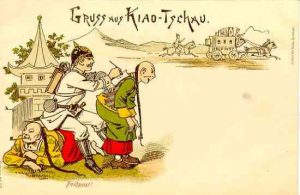
One area of my recent scholarly activity has been investigating the impact of the German Sonderweg thesis on the historiography of modern Japan and China, as well as the influence of Germany on Japanese higher education. I became interested in this topic as a consequence of his discovery of the close contacts between Japanese and German scholars in the social sciences before the First World War while doing archival research for my first book. Since the 1960s, American scholars of Meiji Japan have made use of those connections to posit a Japanese Sonderweg (special path) which draws on many of the same concepts and theories of its German counterpart and posits many of the same historical pathologies. On closer inspection, however, these arguments are tendentious and built on an edifice of scholarship that has since been called into question or is no longer tenable in an unqualified form. With respect to China, my scholarship has explored the way current American policymakers and commentators have been prone to view a rising China in Wilhelmine terms, drawing explicit parallels between Britain’s strained relationship with Imperial Germany and the evolving relationship between the United States and China. Likewise, Chinese nationalism and domestic developments have been viewed through a lens strongly distorted by the German Sonderweg thesis. So far six pieces on these topics have been completed: (1) “German Social Science, Meiji Conservatism, and the Peculiarities of Japanese History,” which appeared in the Journal of World History; (2) “China’s German Syndrome: Germany’s Long Nineteenth Century and the Rise of China,” which was a German Studies Association conference paper; (3) “Die preußische Bildungspolitik im Spannungsfeld des internationalen Kulturwettbewerbs: der Fall Japan (1869-1914),” which was published as part of a Berlin-Brandenburg Academy of Sciences project; (4) a longer review article entitled “National Identity in the Vanquished State: German and Japanese Postwar Historiography from a Transnational Perspective,” which appeared in History and Theory; (5) an article entitled “The Mature Limited Access Order at the Doorstep: Imperial Germany and Contemporary China in Transition” applying the limited/open access order framework of Douglass North, John Wallis and Barry Weingast to Wilhelmine Germany and contemporary China, which appeared in Constitutional Political Economy; and(6) an article entitled “Bismarck von einem Kontinent zum anderen: Der Transfer sozialpolitischer Ideen nach Japan und in die Vereinigten Staaten,” on the transfer of social policy ideas from Germany to Japan and the United States that was part of a German Historical Institute Paris conference and published in Francia.

